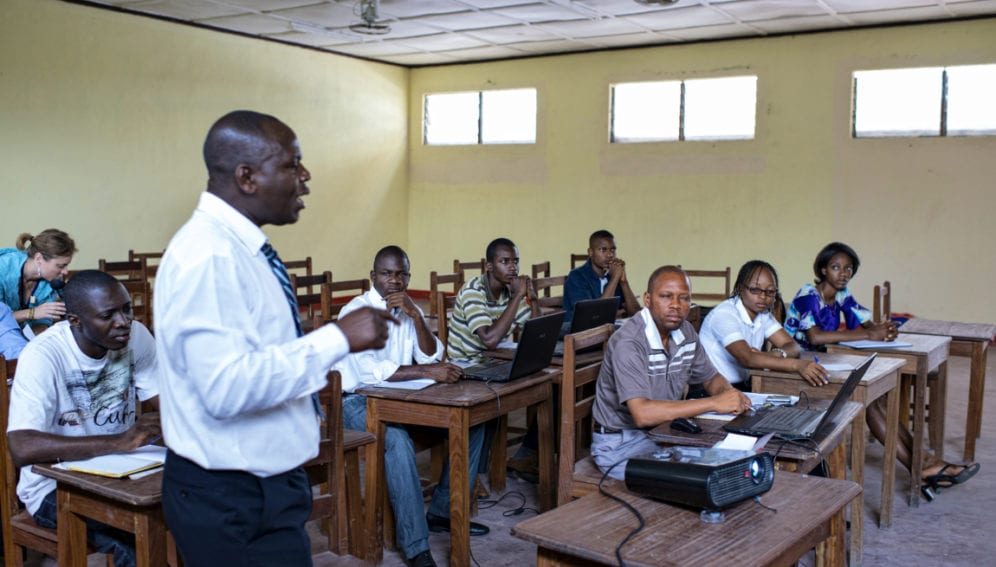By: Linda Nordling
Send to a friend
The details you provide on this page will not be used to send unsolicited email, and will not be sold to a 3rd party. See privacy policy.
Africa needs a more frank debate on the benefits and drawbacks of ‘brain circulation’, writes Linda Nordling.
The online debate that was organised by SciDev.Net about the future of African higher education on 30 June touched on the burning issue for the continent’s universities: Is academic mobility between African countries a good or a bad thing?
At face value this might seem like an ill-advised question. Universities in developed countries tend to be populated by staff from all over the world. We also often complain that African scientists are isolated from each other, and do not collaborate with colleagues in neighbouring countries. Boosting intra-African academic mobility would be an easy fix for this, no?
Not necessarily, and certainly not for every African university. Goolam Mohamedbhai, the former secretary-general of the Association of African Universities, and an independent higher education consultant, did a good job of pinpointing the trouble with African academic mobility in the online debate.
“Many academics that I have spoken to say they would love to work in their home countries, even for lesser pay, if they could do so in academically supportive environments.”
Linda Nordling.
“I am told that if Africans move to work within Africa, this is brain circulation, not brain drain. But for a particular country I think it is brain drain. When doctors and engineers trained in Malawi and desperately needed there, go and take up lucrative jobs in South Africa, is that not brain drain?” he wrote.
Mohamedbhai then asked the million-dollar question facing Africa’s many under-funded and under-staffed universities: “But how [do you] prevent them from moving if salaries and conditions of service are very poor in their country”?
The tussle over brains
For me, the frustration that many African university leaders feel when their best brains leave for plush jobs in South Africa and other better paying African countries got a face during a two-day workshop in Pretoria, South Africa, in October last year.
The workshop on the future of African doctoral education was arranged by the Carnegie Corporation of New York in the United States and South Africa’s National Research Foundation. It gathered dozens of senior representatives from universities all over Africa.
One of participants, George Magoha, the vice-chancellor of the University of Nairobi in Kenya, was furious. Protesting against the meeting’s support for boosting collaboration between universities for training doctorates, he accused colleagues from better-resourced institutions in South Africa of cold-heartedly poaching of his best talents.
So many promising young scientists who leave Kenya for South Africa never return, he said. “We expect South Africa to lead from the front, but they are doing the reverse of what they should be doing,” Magoha added. He noted that the continent’s top universities should accept their responsibility and scale down recruitment from institutions in neighbouring countries.
Magoha’s criticism may have caused some discomfort among the workshop delegates, in particular those hailing from South Africa’s research-intensive universities, such as the University of Cape Town, which pride themselves on their academic achievements.
But few people at the workshop outright contested his point which, while uncomfortable for some to hear and discuss, is a fair one.
A mistaken, unworkable solution?
But if ‘academic poaching’ is a problem in Africa, Magoha’s preferred solution — for attractive academic employers in Africa to stop recruiting from poorer institutions on the continent — is a nonstarter.
It flies against the current pan-Africanist movement for making it easier, not harder, for African professionals to move between countries. Indeed, increasing academic mobility is one of the key messages in the African Union’s ‘Vision 2063’, a blueprint for the continent’s development over the next half century.
“Creating opportunities, even if these involve small financial reward, is key to retaining staff.”
Linda Nordling.
But Magoha’s solution is also unworkable. Africa’s brain drain — both within and away from the continent — is not something that has happened as borders have become easier to cross. Academics who have wanted to leave home for greener pastures have done so for generations, even when it was difficult to do so.
In other words, you can’t force academics to stay put. So what can you do? Appeal to their sense of patriotism, as one commentator suggested during the online debate?
Perhaps, but patriotism alone won’t help. One of the things counting in the favour of the continent’s struggling universities is that most people, if given a choice, like to stay at home. Many academics that I have spoken to say they would love to work in their home countries, even for lesser pay, if they could do so in academically supportive environments.
Unfortunately, many African universities do not provide good conditions for young talents. Indeed, many do the opposite. A challenge for African universities is ‘inbreeding’—academics spending their entire career from undergraduate to senior posts at the same institution.
If brain poaching erodes a country’s intellectual elite by removing its talent, inbreeding does the same by strangling curiosity and ambition. Where inbreeding is the norm, promotions are rarely based on performance, but handed down to people based on their age, their titles or connections to the university management.
So no, forcing people to stay will not work. Creating opportunities, even if these involve small financial reward, is key to retaining staff. University leaders can make a big difference by reforming institutional structures so that they are better able to give credit where it’s due.
Good academics will always be curious wanderers. But they, too, love their homes. Their homes simply do not always love them back.

Journalist Linda Nordling, based in Cape Town, South Africa, specialises in African science policy, education and development. She was the founding editor of Research Africa and writes for SciDev.Net, Nature and others.
This article has been produced by SciDev.Net's Sub-Saharan Africa desk.














